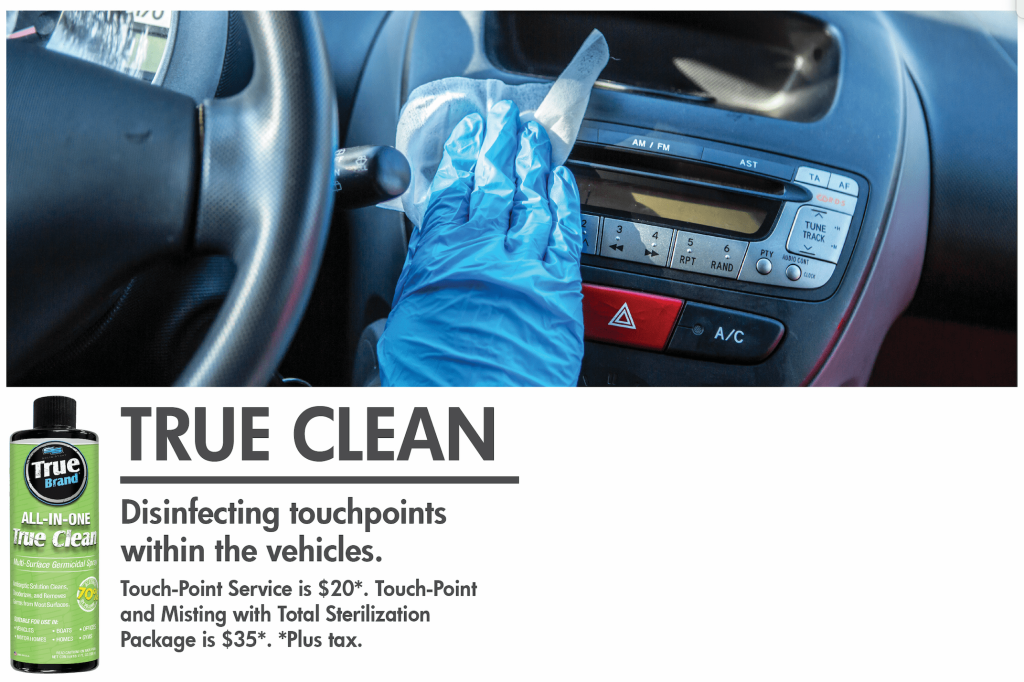
 Our cars and trucks are in every part of our lives from getting us to work to taking us to date nights and evening practices. Keeping up with regularly scheduled oil changes is important, and choosing the right motor oil should not be a daunting task.
Our cars and trucks are in every part of our lives from getting us to work to taking us to date nights and evening practices. Keeping up with regularly scheduled oil changes is important, and choosing the right motor oil should not be a daunting task.
While there are many brands and types of motor oil on the market, we at Fast Lube Plus choose Mobil 1 motor oil. The engine oil you choose matters. Mobil 1 offers a full range of high-quality Mobil products you can trust for all your vehicles!
How does technology in Mobil1 protect your engine?
Mobil 1 oil was designed so that all the oil is consistent in size, unlike conventional oils. This helps minimize the amount of friction in your engine. Mobil 1 oil maintains excellent viscosity control to provide protection even in low and high temperatures. It provides protection and durability to help keep engine parts clean and free of unwanted debris.
Mobil1 motor oil is made for all engine types, and every one of their motor oils is formulated with a high-performance base stock that is designed to provide optimum low and high-temperature protection in each viscosity grade. Your vehicle deserves an engine oil that works hard to keep your vehicle(s) running smoothly.
What are the benefits of Mobil1 Synthetic engine oils?
- Unsurpassed engine protection
- Superior resistance to high temperatures
- Great low-temperature performance
- Exceptional cleaning power
- Lower oil consumption
- Surpasses manufacturers’ specification
- Original car builders’ recognition
- Increased engine life
- Proven performance
- Improved fuel economy
How often should I have my oil changed?
Oil change recommendations vary by model, year, and manufacturer. Check your owner’s manual to find the recommended intervals and mileage for your vehicle.
Is it time for your next oil change? Stop by one of our six convenient locations around the triangle. No appointment necessary!
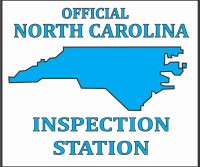
As a resident of North Carolina and a vehicle owner, you are required to have a North Carolina State Inspection done in order to obtain your vehicle’s yearly registration. Car owners are not able to renew their vehicle’s registration or get their yearly sticker for their license plate registration until the vehicle receives a satisfactory certificate of inspection.
Here is what you need to know. Every year, within 90 days of your annual registration date you need to bring your vehicle in to be fully inspected.
The North Carolina State Inspection looks over items such as:
- Brakes
- Steering System
- Turning Lights
- Windshield Wipers
- Aftermarket window tinted Window Grade
- Lights (headlights, tail, brake, plate, and turn signals)
- Tire Condition
- Horn
- Mirrors
If your car is more than 35 years old you are not required to have it inspected.
North Carolina is fighting ozone-forming emissions from gasoline-operated cars and light-duty trucks, Wake and Johnston County require a vehicle emissions check as well.
How is a vehicle’s emissions checked? Inspections are conducted using the vehicle’s On-Board Diagnostic (OBD) system, computerized equipment installed on all new vehicles since 1996.
There are currently 22 counties in North Carolina that require vehicle owners to pass both an Emissions Inspection and a Safety Inspection.
Where can I get my car inspected? Did you know Fast Lube Plus is licensed to perform both OBD and Safety Inspections? We perform these services in compliance with state guidelines. Fees for these services are regulated by the state of North Carolina.
What happens if my vehicle fails an NC Vehicle Safety Inspection? If your vehicle fails inspection, your vehicle can be presented for re-inspection within 60 days of the original failed inspection. Once your vehicle passes, you will be eligible to apply for your yearly vehicle registration.
Stop by any six of Fast Lube Plus’ convenient locations to have your North Carolina State Inspection done. No appointment is necessary!
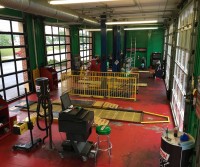
An oil change is an important part of your vehicle’s routine maintenance. Today most vehicles are programmed to alert you when an oil change is needed, but it’s also important to understand when one is truly necessary.
What Are The Warning Signs for Oil Change?
If your vehicle does not monitor oil, or you are concerned about your vehicle’s performance, here are 5 common warning signs your vehicle is in need of an oil change.
- Dark, thick, dirty oil
- Loud noises, knocking or ticking sounds coming from the engine
- An Oil Change or Check Engine light is on
- Some coming from the exhaust
- Oil smell within the cabin
How Does an Oil Change Help My Vehicle?
When you have your vehicle’s oil changed routinely, you are helping relieve stress from your engine. Keeping up with oil changes helps your vehicle do an efficient job lubricating, cleaning and cooling engine parts. Clean motor oil, along with clean oil filters, helps keep your vehicle’s engine running smoothly.
What’s Included in a Full-Service Oil Change?
When you have a full-service oil change at Fast Lube Plus, you can expect our technicians to do a comprehensive maintenance service that includes.
- Your choice or oil (synthetic or conventional)
- Oil filter replacement
- Lubrication to all fittings
A technician will check the following:
- Air Filter
- Engine Inspection for leaks
- Belt and Hose inspections
- Tire Pressure Check
- Inspection of your vehicle’s undercarriage
What Is Synthetic Oil?
Synthetic oil is a man-made oil from artificially made chemical compounds. They have a naturally higher viscosity index which is designed to help provide advanced protection against major engine stress such as friction, heat, and debris.
What is Conventional Oil?
Conventional oil is an oil lubricant that is derived directly from crude oil. It has excellent properties that allow it to provide lubrication at high and low temperatures. Conventional oil is more likely to thin at higher temperatures and thicken during colder temperatures.
**
Stop by one of Fast Lube Plus’ six convenient locations to have your vehicle’s oil changed by one of our experienced technicians. Looking for oil change coupons to help save money on your next visit? Click Here.

A vehicle tune-up is an important part of your car servicing. Besides your regular oil changes, performing routine maintenance can help extend the life of your vehicle. It can also help reduce the cost of future repairs.
You can check your vehicle’s owner’s manual to find out the recommended tune-up schedule for you. Newer vehicles can go from 25,000 miles to as many as 100,000 miles without needing a major tune-up.
Does My Car Need a Tune-Up?
Being proactive with your vehicle can help fix a minor problem before something major happens. A tune-up makes sure your vehicle functions properly and helps prevent future damage.
If you haven’t had a tune-up in a while, becoming familiar with common warning signs can save your time and frustration. Consider these common indicators that something wrong might be going on under the hood of your vehicle.
Vibrations or shaking
Noticing a shaking sensation in your steering wheel while you’re starting your vehicle, steering, or braking? This could be a sign of a number of different issues; from bad brakes and routers to your power steering. These types of problems are best to get it checked out by the professionals!
Rough shifting
Your vehicle’s automatic transmission handles how your vehicle’s gears-shift. Is your vehicle’s transmissions shifting hard, jerking, or shaking during a shift change? If it is, your vehicle’s transmission fluid may need to be changed or the fluid level may be too low.
Stalling
There are three primary causes of your vehicle stalling: .1 lack of fuel, 2. not receiving enough air or, 3. insufficient power. These can be caused by dirty or fouled spark plugs, water in the fuel, a faulty fuel pump, a bad ignition coil, or a bad sensor. Regardless of what is causing your car to stall, the best way to avoid high repair costs is to get your vehicle checked as early as possible.
Check Engine Light
This is usually a strong indicator that something is not working properly. When check engine light illuminates your dash, your vehicle’s computer stores a “trouble code” in its memory that identifies the source of the problem. When your check engine light comes on, it’s important to bring your vehicle to a professional so that your vehicle can be hooked up and diagnosed by reading warning code from your vehicle’s computer.
Is your car ready for a tune-up, or is your vehicle showing signs of a problem? Did you know that all six of your local Fast Lube Plus location can help you diagnose what is happening under the hood of your vehicle? Stop by today!

When it comes to your vehicle’s engine, nothing is more important than providing it with routine maintenance. Oil changes are essential for a healthy, well-functioning vehicle.
Did you know that a vehicle’s engine is made up of many moving parts? To avoid damage to your engine, and have it functioning properly, all of those parts need to stay well lubricated.
Over time, the oil that is circulating and lubricating your engine will break down and can become contaminated with particles of dirt and dust from the environment as well as the engine. As oil breaks down, it loses its natural thickness or viscosity, causing it to lose its ability to lubricate.
If your oil is contaminated with debris, your vehicle’s engine cannot properly lubricate all the moving parts; in return, your engine will not be able to properly function. Making sure your vehicle has clean and sufficient amounts of oil is an easy way to prevent too much friction and overheating of the engine. Routine oil changes keep your engine clean and can also help with better gas mileage. Without proper maintenance, all that dirt and debris we talked about earlier can build up inside your vehicle’s engine causing friction. Friction will cause poor engine performance.
When should you get an oil change?
Typically, it’s recommended that you take your car after 3,000 to 5,000 miles for an oil change. Depending on the type of oil you use, your vehicle, and how much you drive will help you better understand the frequency of routine oil changes. A few signs your vehicle is low on oil include burning smells, clunking sounds and low engine performance. Check over the owner’s manual for your vehicle to be sure the oil is changed at the proper intervals recommended by your manufacturer.
Routine maintenance is essential for the life of your vehicle; without it, your vehicle could end up having more problems and a shorter life span.
Stop by one of Fast Lube Plus’ six convenient locations to have your vehicle’s oil changed by one of our experienced technicians. Looking for oil change coupons to help save money on your next visit? Click Here.
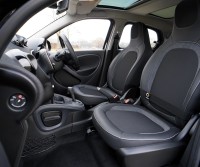
Keeping your vehicle clean has always been an important part of extending the life of your vehicle, but now it’s also important to help keep yourself and your family healthy.
Washing your hands and disinfecting high-touch surfaces are two of the best ways to defend against spreading the coronavirus, according to the Centers for Disease Control and Prevention (CDC).
Common Touch Points
When you begin to clean and sanitize your vehicle, start by working your way from top to bottom, start with the sun visors, then moving down the console, and then to your dashboard. Touchpoints in your vehicle extend further than your door handles and steering wheel.
- Door Handles
- Steering wheel
- Mirrors
- Console buttons
- Seatbelt
- Radio
- Trunk handle
- Children’s seats
- Armrests
How do you safely disinfect the interior of your vehicle without causing damage?
Your vehicle has a collection of various materials, fabrics and surfaces that need to be cleaned. Using cleaners like hand sanitizers and bleach wipes that would most definitely kill viruses, but would also risk damaging the various materials in your vehicle.
According to Jeff Stout, executive director global innovation at Yanfeng Automotive Interiors, nearly every interior surface of a vehicle can be cleaned with isopropyl alcohol (which is the most common and widely used disinfectant within pharmaceutics, hospitals, cleanrooms, and electronics or medical device manufacturing, according to PAC Industries.)
Though the easiest way to fight against germs and the Novel Coronavirus, according to experts is to use soap and water. Most household dish soaps are made with only mild detergents, and “Kill 99.9% of Germs,” and are much less harmful on your car’s interior.
Try To Avoid These Types of Products:
- Ammonia-based cleaners on your vehicle’s touch screens; they can damage their anti-glare and anti-fingerprint coatings.
- Bleach or hydrogen peroxide can ruin your upholstery, remove protective coating and dry out your interior.
Are you looking to have your vehicle professionally cleaned and sanitized? Fast Lube Plus is now providing the True Brand True Clean Touch-Point Service and Touch Point and Misting with Total Sterilization Package.
True Brand ALL-IN-ONE TRUE CLEAN GERMICIDE is a MULTI-SURFACE GERMICIDAL llAY with 70% alcohol formulated to clean and destroy the growth of harmful microbiological organisms on high-traffic touch areas.
Our team will disinfect all high traffic areas such as door handles, door panels, steering wheels, shifter knobs, seat belts and more. Contact us today!
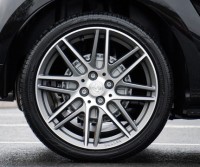
As a car owner, one of the most important steps in prolonging the life of your vehicle is to perform routine maintenance. Following the recommended time frame and schedule in your owner’s manual is a great way to keep your vehicle running at its best, increase its life and save money on repairs!
When there is a problem, sometimes it is tempting to “do it yourself” to save money, but it’s important to leave some, like the ones below, to the professionals.
Tire Rotation
Routinely rotating your tires is one of the easiest ways to prolong their life. Did you know that all of your tires do not wear the same?
While you may think it is an easy task to jack up your vehicle to rotate your tires, it’s a job that needs to be very done accurately by someone with training. When rotating your tires, it’s important to make sure everything is re-balanced and aligned for even wear and tear of your tires’ sidewall and tread. Rotating your tires on your own could put you at risk of driving with an unsafe alignment! This is an inexpensive maintenance item; leave it to the pros.
Check Engine Diagnostics
Check engine lights make it easy to “self diagnose” with newer vehicles. You can go to your local auto store or even download an app to your phone! The problem with using those programs to diagnose your vehicle is that many check engine codes are vague. Instead bring your vehicle into a place like Fast Lube Plus where there is high level equipment to get a more in-depth read of the issue – saving you money in the long run. By letting a professional read and decipher the code, they can use their expertise to help correctly solve your problem!
Keeping Your A/C Cold
The next time you’re in your vehicle and your A/C feels like it’s just not cooling down your vehicle the way it should, you should have a mechanic evaluate what’s wrong with the system before you consider going to your local store to pick up a DIY A/C recharge kit.
While it’s tempting to just spend a few dollars on a recharge kit, you could do MORE damage to you’re A/C. If you’re A/C is low on Freon there is probably a leak. DIY kits can be a quick fix but will not fix the underlying problem. They can also overcharge the system and cause more issues to the valves and seals inside the A/C’s compressor, causing them to crack from the pressure.
If you need to get your A/C under control leave the job to the professionals at Fast Lube Plus!
***
Saving money by doing it yourself can work for some fixes on your vehicle, just make sure you do your research, as you may be facing a larger financial cost if you attempt to “fix” the problem on your own. Our team at Fast Lube Plus understand what it takes to repair your vehicle to have it functioning at its best!

Summer is here and that could mean a family road trip is on the calendar! Before you hit the open road, it is important to make sure your vehicle is up for the trip! Make your vehicle maintenance part of your pre-trip preparation.
Change Your Oil
Check your oil level and the date that you last got an oil change. If you’re close to needing new oil, stop by your local Fast Lube Plus for a quick and convenient oil change service.
Ensuring you have enough oil in your vehicle and a fresh filter will help your car perform at its best!
Pack Your Summer Vehicle Emergency Kit
Summer road trips are very popular. While you may have taken all the precautions before your trip, you may still find yourself needing an Emergency Kit if your vehicle breaks down or you get into an accident. It’s important to make sure you have enough supplies for your entire family.
A quick list of items to include in your kit are the following:
A flashlight, antiseptic wipes, Band-Aids, tweezers, iodine, duct tape, small tools (wrench, pliers, scissors), and road flares . You should also consider including items such as sunscreen, blankets, bottled water, and non-perishable snacks.
Items to Have During the COVID-19 Pandemic:
- Hand sanitizer
- Disposable gloves
- A Mask
- Disinfectant wipes
Top Off Your Fluids
While making sure your engine’s oil is very important when performing routine maintenance, it’s also important to make sure your brake fluid, engine coolant, windshield washer fluid, power steering fluid, and water for the radiator are filled to correct levels for safe vehicle operation.
Making sure your vehicle’s fluids are at the appropriate levels will help keep your vehicle running smoothly, as well as keep you and your family safe.
Make sure your AC is running COOL
North Carolina summers can be brutal. Before any long-distance road trips, take a quick test drive to make sure that your vehicle’s AC is blowing strong. If you notice a decrease in your cool air, bring your vehicle into your local Fast Lube Plus to have your AC diagnosed.
Check Your Tires & Brakes
When checking your tires, make sure the vehicle has been idled and the tires are cool. Inspect all four tires for cuts, gouges, and bulges.
You can check your tread by inserting a quarter upside down into the grooves.
When checking the tire pressure go by the number in your vehicle manual- not the number on the tire!
To check your breaks, take a test drive around town. If you feel a vibration when applying the brakes or hear a grinding sound, head over to your local Fast Lube Plus for a brake inspection!

Inspecting your car and making sure it is in great shape is an important thing to do before any road trip. You should consider an oil change (if you are anywhere near the recommended mileage), check your tire tread and tire pressure, make sure your AC is working properly, and even check your cabin air filters. High summer temperatures can be brutal if you’re stranded or stuck waiting for a tow or roadside service; so it’s also important to make sure your vehicle has a Summer Emergency Kit.
Being prepared for a roadside emergency is important. So, what should be in your vehicle’s Summer Car Emergency Kit?
- First Aid Kit: Make sure to include some bandages, ointment, gauze, adhesive tape and tweezers, single-use cold packs, sunscreen stick and for those with life-threatening allergies, include an EpiPen.
- Jumper Cables: A set of jumper cables is sure to provide an effective solution and is a key item! They are beneficial to have throughout the year, not just during the colder months!
- Flash Light: Always a great idea for owners to have in their vehicle.
- Items to Fix a Flat Tire: Carjack, lug wrench, and a spare tire are essential to your flat tire tools and are an important component of your Summer Emergency Kit. Packing a tire sealant and gauge to repair a small hole on your own can also be quite useful.
- Small Toolkit: You may not need a lot of tools, but keeping a small tool kit with basics such as a few different size screwdrivers and pliers and an adjustable wrench.
- Hazard Flares and Reflective Triangles: If you ever break down and need to work on your vehicle, Reflective Triangles, and/or LED flameless flare are essential items that will help to keep you safe.
- Non-Perishable Snacks: Car trouble can leave you stranded for a period of time. Pack non-perishable snacks that won’t melt; like crackers, granola bars, dried fruit, and nuts. Don’t forget bottles of water to stay hydrated.
Summer is here and many families will be traveling by car this year for their vacation or day trips. Prepare your vehicle and pack your Summer Emergency Kit today to ensure the safety of you and all your passengers for your next trip!
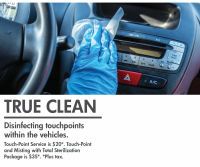
We are happy to announce that Fast Lube Plus is now providing the True Brand True Clean Touch-Point Service and Touch Point and Misting with Total Sterilization Package.
True Brand ALL-IN-ONE TRUE CLEAN GERMICIDE is a MULTI-SURFACE GERMICIDAL llAY with 70% alcohol formulated to clean and destroy the growth of harmful microbiological organisms on high-traffic touch areas. It removes bacteria and
disinfects inanimate objects and surfaces from organisms such as bacteria, viruses fungi while also helping deodorize.
Our team will disinfect all high traffic areas such as door handles, door panels, steering wheels, shifter knobs, seat belts and more. Contact us today!
